The Pattern of Abdi Dalem Communication in Improving Cultural Values in The Duchy of Pakualaman
DOI:
https://doi.org/10.46961/mediasi.v5i3.1428Abstract
Amid today's modernization, communication between courtiers is essential in developing cultural values in the Kadipaten Pakualaman environment. This research aims to determine communication patterns in the Pakualaman Duchy environment in maintaining and developing traditional Javanese cultural values. This research is a qualitative descriptive research. Data was collected through interviews, observation, Focus Group Discussion (FGD), and documentation. Data were analyzed using qualitative descriptive analysis techniques. This research shows that Abdi Dalem's communication patterns are starting to experience openness, which can be seen from the maintenance of cultural values in Kadipaten Pakualaman, using Fine Javanese (krama) and Indonesian. Abdi Dalem's communication patterns in the Kadipaten Pakualaman environment include openness, speed, use of communication media tailored to needs, communication using verbal and non-verbal language, and maintaining good manners.
Downloads
Published
How to Cite
Issue
Section
Citation Check
License
Copyright (c) 2025 Devi Wening Astari

This work is licensed under a Creative Commons Attribution-NonCommercial 4.0 International License.
You are free to:
- Share — copy and redistribute the material in any medium or format for any purpose, even commercially.
- Adapt — remix, transform, and build upon the material for any purpose, even commercially.
- The licensor cannot revoke these freedoms as long as you follow the license terms.















